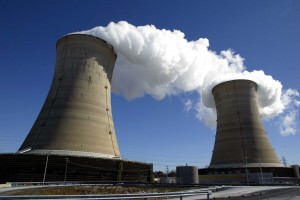Feds Seek Public Input On Plan to Decommission Three Mile Island
Thirty-five years after the worst nuclear accident in U.S. history, plans for the eventual decommissioning of the Three Mile Island plant are still causing a stir.
In a sparsely attended yet contentious public meeting tonight in Hershey, the federal Nuclear Regulatory Commission discussed plans for the eventual decommissioning of the plant.
About a dozen people turned out to talk about the plans, which call for dismantling the mothballed Unit 2 along with the operational Unit 1 when its license expires in 2034.
The decommissioning would take place over a ten year period, with full site restoration by 2054 — 75 years after the accident.
Neil Sheehan is a spokesman for the NRC. He says it makes practical and economic sense to decommission the reactors together.
“Would we like it move faster? Yeah. There are many cases where that would be ideal,” he says, But unfortunately there are circumstances that prevent that.”
The process is expected to cost about $950 million (in 2012 dollars).
Representatives from the nuclear watchdog group Three Mile Island Alert criticized the NRC and the plant’s operators for decades of delays—pointing out this latest decommissioning report was submitted 18 years late.
Eric Epstein chairs the organization and says he doesn’t believe the plant will be cleaned up until the 22nd century.
“I’ve been coming to meeting, after meeting, after meeting for 35 years. The projections have been off. The promises have been broken.” he says, “I think a lot of people are operating under the assumption the plant has been cleaned up– it’s been de-fueled. One of the most vexing problems is there’s nowhere to take the waste.”
The decommissioning report was submitted to the NRC by FirstEnergy, which owns Unit 1, earlier this summer.
Although the NRC is not required to approve the report, it’s under review and the agency is seeking public comment.
You can read the report below:

















